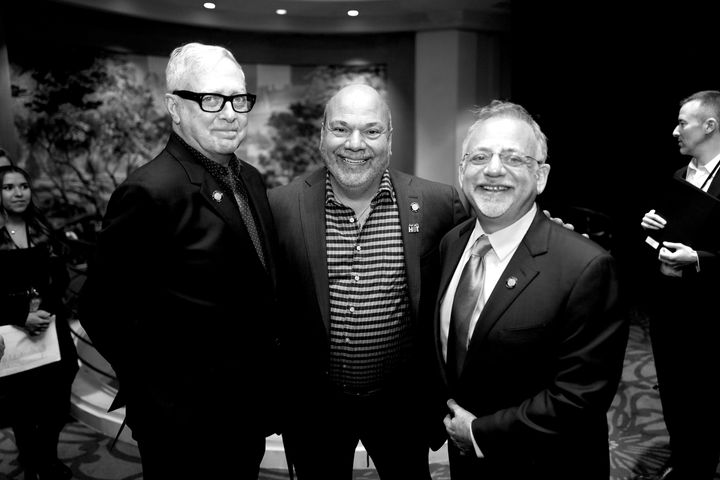
To paraphrase a line from his latest project, Broadway’s Casey Nicholaw has spent much of the spring enjoying the sweet end of a metaphorical lollipop.
Last week, Nicholaw received two Tony Award nominations for best direction of a musical and best choreography for his work on “Some Like It Hot,” now playing at New York’s Shubert Theatre. The show, a musical adaptation of Billy Wilder’s 1959 romantic comedy of the same name, also nabbed an additional 11 Tony nods ― including a historic honor for actor J. Harrison Ghee, who is nonbinary ― making it this season’s most-nominated theatrical production.
“Being able to return to doing an original musical after the [COVID-19] pandemic is huge,” Nicholaw, a California native whose credits include “Something Rotten!” and “The Prom,” told HuffPost. “We lived a life through this show, if you know what I mean. We were all there doing our testing every day. Some of it was scary; some of it was unknown. So the fact that we are here now ― I think everyone is grateful for that. I know I am.”

Like the film on which it was based, “Some Like It Hot” tells the story of two Prohibition-era musicians, Joe (played by Christian Borle) and Jerry (Ghee), who find themselves on the run after witnessing a mob hit in Chicago.
Strapped for cash and fearing for their lives, the two dress in drag to pass as female performers Josephine and Daphne before joining an all-women band that’s about to embark on a cross-country tour. Along the way, Joe/Josephine finds himself smitten with the band’s lead singer, Sugar Kane (Adrianna Hicks), while Jerry/Daphne discovers their authentic self as a nonbinary person.
“Some Like It Hot” opened on Broadway in December of last year to near-universal acclaim from critics. Still, there were some hurdles to overcome, from the pandemic to concerns about how the storyline would resonate with a contemporary audience. Prior to its premiere, the show was compared unfavorably to a number of recent musicals, including “Mrs. Doubtfire” and “Tootsie,” that have presented their lead actors in drag.

LEONARDO MUNOZ via Getty Images
“We had to be very careful about making it about the humanity and what these characters learn: Joe realizing he wouldn’t do well as a woman, and Jerry/Daphne going, ‘Wow, I feel comfortable in this,’” Nicholaw said. “The exploration of Daphne was very appealing to us because it wasn’t just being done for a gag. To be able to see J. tell Daphne’s story is fantastic.”
Others felt there was no way the show would retain the impact of Wilder’s film, which starred an effervescent Marilyn Monroe as Sugar alongside Tony Curtis and Jack Lemmon as Joe and Jerry.
To differentiate the musical from the film, the primary setting has been moved from Florida to California. Many principal characters ― including Sugar, Jerry/Daphne and bandleader Sweet Sue ― are played by actors of color. And the show’s jazz-inflected, bluesy songs, written by composers Marc Shaiman and Scott Wittman, sound both modern and playfully nostalgic.

Audiences and critics alike have singled out “Tip Tap Trouble” as one of the musical’s highlights. The second-act showstopper contains some of the most fast-paced, intricate choreography performed on Broadway in recent years.
Though Nicholaw designed the number to be “the most complicated thing [an audience] has seen,” he had to grapple with the challenge of performing it himself when he stepped into the role of Spats Colombo, usually played by actor Mark Lotito, for a brief stint in March.

Jenny Anderson via Getty Images
“It was like Tetris trying to make sure everything worked, but I did not expect that number to be so hard,” he said with a laugh. “It blew me away. I was like: ’Oh, my God, Mark ― I have you running so much backstage. … I had no idea it was going to be that hard.’”
Though Nicholaw is already a Tony winner for “The Book of Mormon,” the 13 nominations that “Some Like It Hot” received mean as much to him as any of his other projects, large and small.
“One of my favorite things to do is to have people laugh their butts off and then have tears in their eyes, thinking, ‘Oh, my gosh, I did not expect this.’ And I think this show delivers on that,” he said. “I want people to learn from it, be moved by it and just enjoy it, whether it’s by themselves or with other people.”
Many audience members have told him that they’re “going to behave better to this person or this relative” after seeing the show, he said.
“A comment I’ve recently gotten has been, ‘I took my mother and my wife and my son, and we all loved it,’” he added. “As a director, that’s about the best thing you can ask for.”
